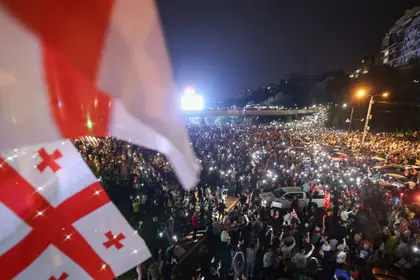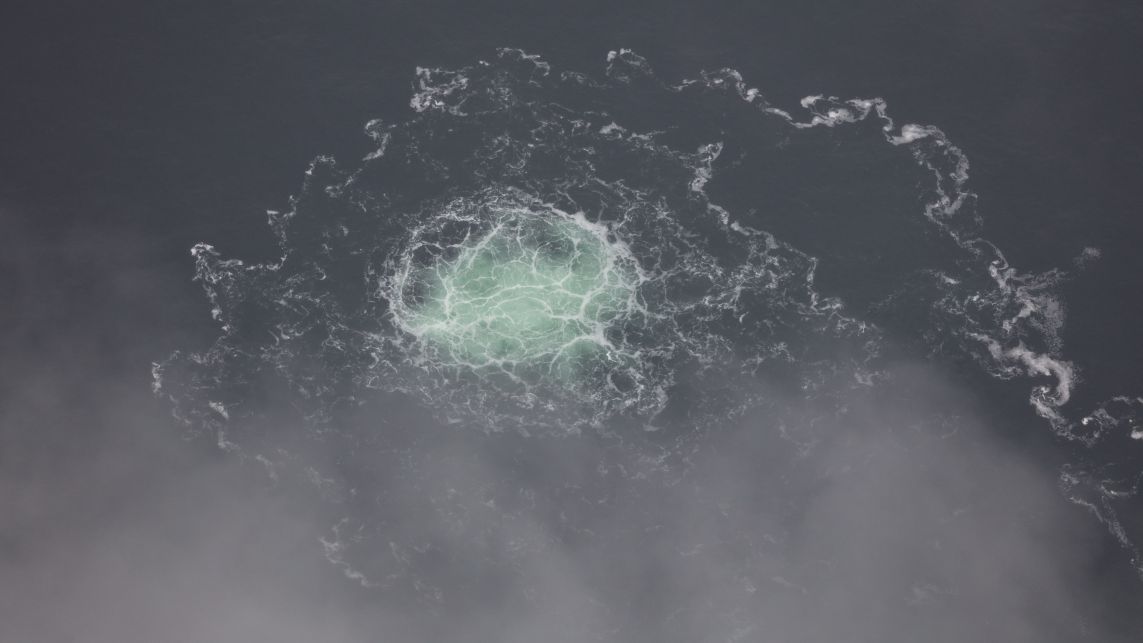The former Soviet republic of Georgia has been rocked by mass protests over a Russian-style "foreign agent" bill that targets foreign-backed NGOs.
Here are 10 key dates in Georgia's history since the fall of the Soviet Union.
JOIN US ON TELEGRAM
Follow our coverage of the war on the @Kyivpost_official.
- 1991: independence -
As the Soviet Union collapses, Georgia unilaterally secedes on April 9, 1991, following a referendum that showed overwhelming support for independence from Moscow.
Georgia becomes the fourth former Soviet state to break away from the USSR, after the three Baltic states of Lithuania, Estonia and Latvia.
- 1992-1994: separatist republics -
Between 1992 and 1994, Georgian forces fight rebellions in the breakaway pro-Russian regions of Abkhazia and South Ossetia.
Under the terms of a June 1992 ceasefire, Russian troops join a joint Georgian-South Ossetian peacekeeping force along that region's frontier.
Two years later, under a similar deal, a mainly Russian peacekeeping force is deployed in Abkhazia.
- 2003: Rose Revolution -
Opposition parties launch mass protests after parliamentary elections that are denounced by local and international observers as rigged.
The peaceful Rose Revolution, so named after opposition MPs carrying red roses as they stormed a parliamentary address by President Eduard Shevardnadze in November 2003, leads to Shevardnadze's resignation.
In January 2004, one of the three opposition leaders who led the protests, Mikheil Saakashvili, wins a landslide victory in presidential elections.

Finland Detains 2 Georgian Nationals Over Undersea Cable Damage
- 2008: Russian invasion -
In August 2008, Russian forces launch an all-out invasion of Georgia as it battles pro-Russian militia in South Ossetia.
The fighting ends five days later with a French-mediated ceasefire. More than 700 people are killed.
The Kremlin subsequently recognises the independence claims of South Ossetia and Abkhazia and reasserts its military control over the regions.
- 2009: exits pro-Moscow bloc -
Georgia becomes the first country to leave the Commonwealth of Independent States, a Moscow-dominated regional grouping of post-Soviet countries.
- 2012: Saakashvili era ends -
The influence on Georgian politics of billionaire Bidzina Ivanishvili, the country's richest man who made his fortune in Russia, becomes clear in 2012, when his Georgian Dream party wins a majority in parliament.
The party is accused of attempting to steer Georgia closer to Russia.
Saakashvili flees Georgia, fearing arrest.
- 2014: EU association deal -
In 2014, Georgia signs a far-reaching association accord with the EU that covers sectors including energy, justice, foreign policy and culture.
In exchange, it pledges to respect the rule of law and fight corruption.
- 2020: post-election crisis -
In October 2020, Georgia is again plunged into crisis after parliamentary elections won by Georgian Dream that are marred by accusations of fraud.
Thousands of people take to the streets of Tbilisi calling for snap parliamentary elections.
When Saakashvili returns to Georgia in 2021, he is arrested and jailed for six years on abuse of power charges.
- 2022: Ukraine war demos -
After Russia's invasion of Ukraine, protests break out in the Georgian capital Tbilisi, in support of Ukraine.
In June, the EU grants candidate status to Ukraine and Moldova but defers Georgia's membership application arguing Tbilisi first needs to implement reforms. Georgia was granted candidate status in December 2023.
- 2024: 'foreign agents' bill -
Georgia is rocked by mass protests starting in early April, after Georgia Dream reintroduces a Russian-style bill labelling Western-backed NGOs "foreign agents" that protesters had forced it to shelve in 2023.
The legislation requires independent NGOs and media organisations receiving more than 20 percent of its funding from abroad to register as an "organisation pursuing the interests of a foreign power".
Critics say it will be used to silence dissent, like in Russia. The ruling party defends it, saying it aims to boost transparency of NGO funding.
The police fire tear gas, water cannon and rubber bullets to disperse tens of thousands of demonstrators against the bill in Tbilisi on April 30, the day before parliament passes the second reading of the bill.
The US says it is "deeply concerned" by the bill while the UN urges authorities to withdraw it.
EU chief Ursula von der Leyen says Georgia, which seeks to join the EU and NATO, is "at a crossroads" and urges it to stay "on the road to Europe."
You can also highlight the text and press Ctrl + Enter










